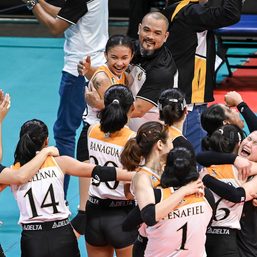SUMMARY
This is AI generated summarization, which may have errors. For context, always refer to the full article.
![[OPINION] Suspending elections involves shameless power grab](https://www.rappler.com/tachyon/r3-assets/612F469A6EA84F6BAE882D2B94A4B421/img/3A86AF5810034D2BAE52D1FF68D7689E/thought-leaders-part-2.jpg)
 (Conclusion)
(Conclusion)
This is a modified version of the statement the author read in the joint hearing of the Senate committee on constitutional amendments and revision of codes and the committee on electoral reforms and people’s participation on March 13, 2018.
Part 1: Notes of caution on Duterte’s preferred constitutional overhaul
Is a no-election scenario possible in May 2019?
This no-el scenario comes from the House of Representatives itself. It is the foundation of House Concurrent Resolution (HCR) Number 9, which was passed last January 16. It is in the report of subcommittee 1 of the committee on constitutional amendments that the no-election scenario of May 2019 is assumed.
On the other hand, the direct declaration that there will be no election for May 2019 comes mainly from public pronouncements by members of the Lower House led by Speaker Pantaleon Alvarez. The initial game plan is to have a new federal constitution approved during the barangay elections in May 2018. However, this timetable expired even before it started because the Senate did not want to cha-cha if Congress, convened as a constituent assembly, is to vote jointly and not separately.
What are the implications of a no-election scenario in May 2019? There are many, but I list only two of the most important.
First, this power grab is damaging to democracy since Filipino voters will be deprived for one legislative term their fundamental democratic right to vote their representatives in the legislative branch, voting being the most important political exercise that helps qualify a political system as minimally democratic.
Legislators, on the other hand, will undermine their electoral mandate from the public as they are going to occupy office beyond the terms they were voted for. Both the mandate-deprived Lower House and the Senate will also find their institutions even weaker than they are now vis-à-vis the already powerful Philippine president, who enjoys a robust electoral mandate that is still good for the next half of his term.
Second, it is injurious to the charter change campaign itself, because it would be exposed as primarily a power grab of self-interested, shameless, and power-hungry legislators, who exploit charter change both as a smokescreen and as an excuse to extend themselves in power.
Changing rules to allow re-election
Suspending elections involves a shameless power grab of changing the rules to avoid elections. However, the question, “If we were to change the Constitution, would incumbent elective officials who have otherwise reached their term limits be allowed to run in the next elections as if they were running for their first terms?” involves a more sophisticated power grab of changing the rules to allow for re-election.
Suspension of elections is about a garapal (brazen) power grab; changing the rules to allow for re-election is a more suwabe (sleek) power grab. But this latter power grab can be more dangerous than the former. This is because, come year 2022, this question will involve the incumbent president himself.
On this re-election question, not only the report of the committee on constitutional amendments of HCR 9 gets implicated but also the proposed federal constitutions of representatives Eugene de Vera and Aurelio Gonzales Jr (Resolution of Both Houses Number 8) and of the PDP-Laban. Because they introduce a new constitution without a provision banning the incumbent president, they must all answer the question whether their new constitution allows the incumbent president of the old constitution – who is barred from running again under the old constitution – to run under the new constitution.
One of the Senate’s resource persons in a previous hearing complained that critics keep on seeing “monsters when there are none,” arguing that there is no term extension for the current president in the PDP-Laban constitution. What he fails to see is the monster he is riding on. Anytime a new constitution is introduced in a presidential democracy with existing term limits, the question of term extension of the incumbent president becomes a central concern.
This is not based on the “fear of the new” but on knowledge of previous constitutional episodes involving elected strongmen who tried to skirt terms limits of their democracies by coming up with a new constitution. Alberto Fujimori did it in Peru in 1993 with his new constitution that ended the single-term limit for president of the 1979 Constitution. Hugo Chavez did it in Venezuela in 1999 with his new constitution that ended the 10-year waiting period for a president to run again under the 1961 Constitution. Ferdinand Marcos tried to do it in 1971-1972 to override the 8-consecutive-year term limit rule of the 1935 Constitution through a constitutional convention to write a new constitution. But Marcos failed, forcing him to fall back on plan B, which was to declare martial law and terminate Philippine democracy altogether. Changing constitutions is a classic strategy of autocratic leaders elected in democracies but who later undermined their own democracies.
This concern on presidential re-election becomes even more serious because the institutional design of the transitory provisions of both HCR no. 9 and RBH no. 8 gives the incumbent president mind-boggling powers, such that the president becomes a one-man hyper executive-legislative package. The powers of the president are almost revolutionary.
For example, the report of subcommittee 1 of the committee on constitutional amendments of HCR 9 says: “The incumbent President shall exercise all the powers and functions of the head of state and head of government under this Federal Constitution until the election of the next President and Prime Minister in May 2022. He shall appoint the new Cabinet from among the Members of Parliament. He shall have supervision and direction over the interim Prime Minister and Cabinet.”
With all these immense powers, and since the new constitution does not bar him to run, he would therefore be in a perfect position to run in 2022, giving him an unbelievable head start over any opposition in the next presidential elections.
Hence, on this issue, the institutional challenge to protect your democracy is to ban the incumbent president – who is covered by the constitutional ban on re-election under the 1987 Constitution – from running as president under the new proposed federal constitutions.
Since federalism is being sold by most Filipino proponents as supposedly fulfilling the need for sweeping institutional changes to improve our democracy, I challenge all the proponents of federalism from the PDP-Laban to members of the House of Representatives and of the consultative committee formed by President Duterte to put their institutional design where their mouth is: write down a provision banning the incumbent president to allay the valid fears of many Filipinos that this shift to federalism is part of the same script of the current president and his key allies to remain in power beyond his constitutionally mandated term limit under the 1987 Constitution.
The statement of President Duterte that he will step down in 2022 even if a federal constitution is passed is as good as his campaign promise to ride a jet ski to the Spratlys, a promise which he now teases his own supporters for believing. To make sure that in 2022 he does not tease the country for believing him in 2018 that he will step down once his term ends under the 1987 Constitution and not run again for president, institutionalize his promise to step down by constitutionally barring him to run in your proposed federal constitutions. Ban Duterte, defend democracy. – Rappler.com
Gene Lacza Pilapil is an assistant professor of political science at the University of the Philippines Diliman. He has an ongoing research project entitled “A Critical Review of the Federalism Project of the Duterte Administration” funded by the Office of the Chancellor of the University of the Philippines Diliman, through the Office of the Vice Chancellor for Research and Development’s Outright Research Grant.
Add a comment
How does this make you feel?





There are no comments yet. Add your comment to start the conversation.